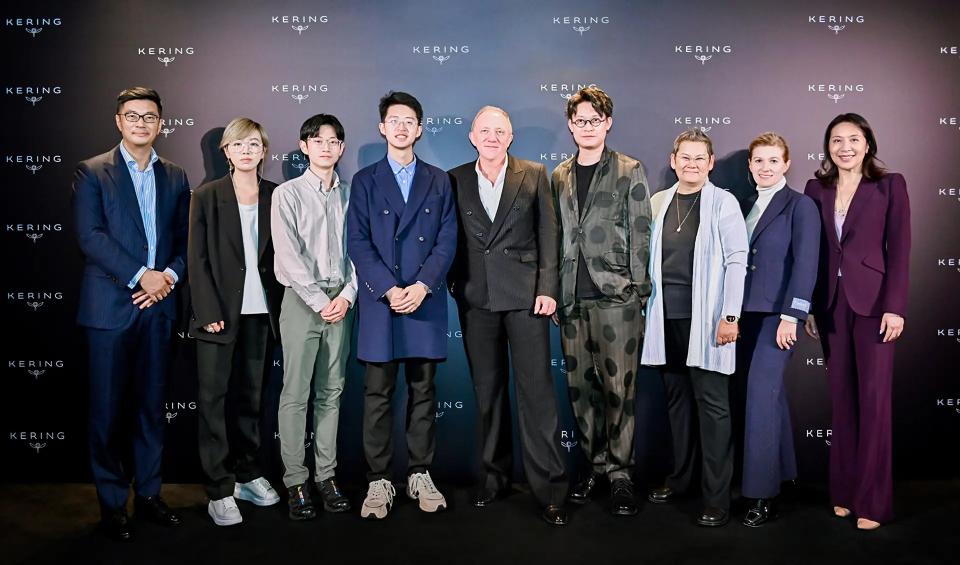Circ Scales Up With Mara Hoffman, Kering’s China Start-up Awards: Short Takes
- Oops!Something went wrong.Please try again later.

FULL CIRCLE: Climate neutral-certified designer Mara Hoffman has added another notch in her sustainable belt: unveiling her first gown using Circ’s Lyocell. The first capsule collection of 35 gowns dropped last week, and Hoffman has committed to incorporating the fiber, which is made up of 50 percent recycled poly-cotton waste, into her collections for the next three years.
It’s the first time Circ Lyocell is being used in the luxury market.
More from WWD
Each gown is numbered and contains a note from Hoffman on the digital care label created by Circ investor Avery Dennison, which backed the textile innovator on a $25 million round of funding back in March. The label itself is another ode to sustainability, made with offcuts and contains a QR code full of the garment’s footprint info.
“In 2015 we made a commitment to make sustainability our framework and part of that journey has been to connect with like-minded people and organizations,” said Hoffman. “We first met Circ over five years ago, and the fabric made with Circ Lyocell looks and feels like silk. This inspired us to highlight the duality of the innovation with a more formal design. Our hope is that this collaboration will generate awareness and inspire other brands to make similar commitments to Circ’s fiber.”
Since the funding round back in March, Circ has been focused on scaling up and delivering its first consumer products to market. Circ’s technology can separate and recover poly-cotton blends, so far a major stumbling block for the fashion industry.
Each year, an estimated 46 million tons of poly-cotton textile waste is landfilled or burned because existing recycling solutions cannot separate the synthetic polyester from the natural cotton and recover both materials, while virgin lyocell uses wood pulp from trees as its main component.
“Mara’s seal of approval helped to initially elevate lyocell and place it on the map for others in the luxury market,” said Circ chief executive officer Peter Majeranowski. The company will continue to take on new designer partners.
Through the label, Hoffman encourages dress owners to return the garment to the brand’s store so that it can be sent back to Circ’s system to be recycled once again.

THREE’S COMPANY: French luxury group Kering held its third annual Kering Generation Awards in Shanghai, to honor three Chinese start-ups focused on sustainability.
Taking the top spot was Yi Design, honored for how it has utilized its location in the porcelain production capital Jingdezhen to collect ceramic waste fragments and turn them into new bricks, tiles and other building materials.
PhaBuilder took second place, with its synthetic biotechnology that creates new materials, including a bio-based nylon precursor called cadaverine that has applications in textiles and synthetic fibers.
Online leather goods repair service Cobbler’s Suggest won the third prize. The app is a pickup and delivery service to reduce environmental waste and support the artisanal cobblers.
The winners were selected by the China Advisory Council and International Jury Board, in conjunction with Silicon Valley-based start-up accelerator and innovation platform Plug and Play. Under the umbrella theme of “coming full circle,” the award evaluated entrants on three key aspects of circularity, including raw materials, product design and business model.
The Gucci, Saint Laurent and Balenciaga parent company chose them to “encourage Chinese start-ups to rethink the way we produce, use and extend the life-cycle of products and resources,” according to Kering’s chief sustainability officer Marie-Claire Daveu.
The first-place winner will take home 100,000 euros, and all three will travel to the Kering headquarters in Paris, with coaching from the group’s sustainability team.
Kering CEO François-Henri Pinault took to the stage with OWSpace concept bookstore founder Zhiyan Xu on innovation and heritage.
“Sustainability is a necessity and a leadership opportunity that also makes good business sense. Faced with complex global issues, we must enhance industry cooperation and join forces to find solutions. The success of our Kering Generation Awards in China demonstrates that promoting innovation in sustainability across borders is one of the solutions to current environmental challenges,” said Pinault of the awards.
“Kering has built on the award to shape a new circular ecosystem and gather a group of innovative pioneers at home and abroad,” added Kering Greater China president Jinqing Cai. “The ever-growing platform is witnessing the growth of this community in China’s fashion industry, as we remain committed to co-curation, exchange and partnership to foster industry transformation.”
Best of WWD

